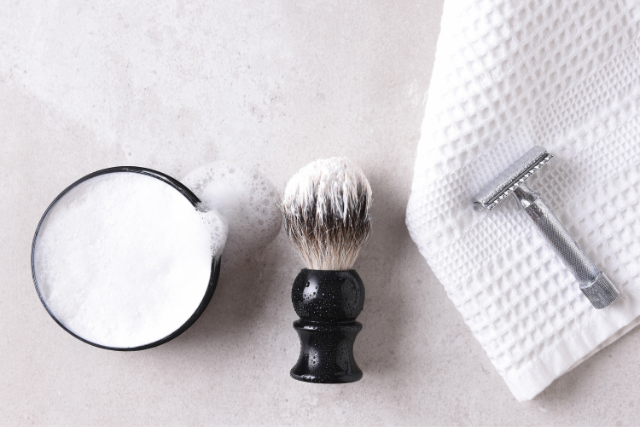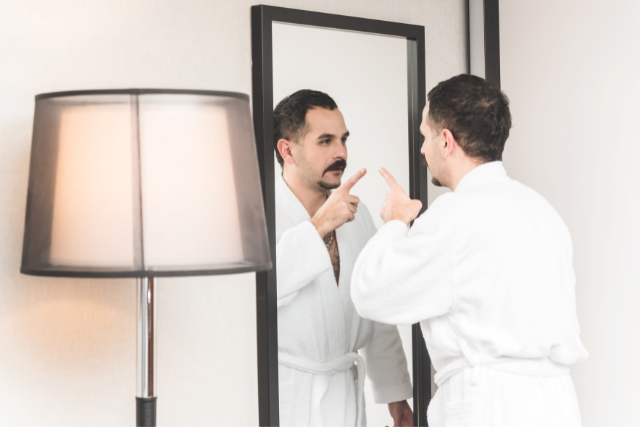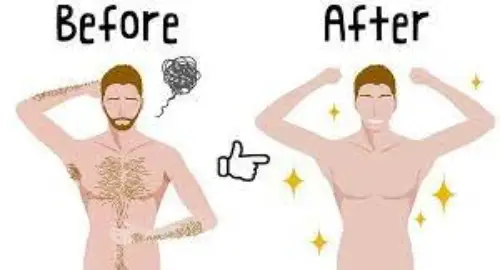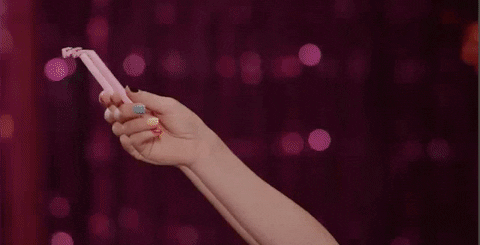Males have their own individual difficulties to contend with when it comes to grooming themselves. One of the most difficult and important decisions is: should men remove their pubic hair? This query has been a source of contention for ages and is still an issue today.
Everyone has their say on this subject, yet what are the real positives and negatives when it comes to deciding whether or not you should shave off your pubic hair?
In this blog post, we'll explore both sides of the argument so that you can make an informed decision about whether or not removing your pubic hair is right for you. Delve deeper to decide if shearing off all (or some) of your body's original fur cover could be advantageous.
Page Contents
Pros of Removing Pubic Hair
Removing pubic hair can have many benefits for black men. Hygiene is one of the main reasons to consider removing pubic hair.
Removing pubic hair can help to reduce the likelihood of contamination, as it eliminates potential sources of bacteria and other pathogens in that area. It also makes it easier to clean and maintain good hygiene practices in this sensitive area, especially when you have the best shaver for balls and all the grooming tools you need for the job.
Appearance is another benefit of removing pubic hair. Many people find a completely shaven or trimmed look more attractive than having full coverage with thick hair.
Additionally, some men report enhanced sensitivity during intimacy when there is no longer any body hair present in the genital region.
Comfort is yet another reason why some black men choose to remove their pubic hair. Having less body hair often means less itching and irritation due to sweat accumulation or friction from clothing materials rubbing against the skin with hairs on them.
Furthermore, reducing the amount of body heat trapped by long hairs can reduce sweating and odors in this sensitive area which can make wearing tight-fitting clothes much more comfortable throughout the day.
Removing pubic hair may have certain advantages, from better cleanliness and appearance to a heightened feeling of comfort; yet, before settling on any choice it is essential to consider the potential downsides too.
Cons of Removing Pubic Hair
Removing pubic hair can come with some drawbacks. The process of removing the hair can be painful, depending on the method used. Razor burns and ingrown hairs are common when shaving, while waxing or sugaring can be uncomfortable for many people.
In addition to pain, there is also an expense and time commitment associated with removal methods such as buying products or services needed for removal and regular maintenance required to maintain results.
Health risks should also be considered before completely removing pubic hair. There is an increased risk of skin infections or allergic reactions due to irritation from razor blades or chemical treatments used in waxing or sugaring that could damage skin cells over time.
Additionally, some people may experience discomfort during intimate activities if all their pubic hair has been removed because it reduces natural lubrication and sensitivity in certain areas.
For those who don’t want to go through the trouble of completely removing their pubic hair, there are alternatives available such as trimming only certain areas or leaving some intact for natural coverage.
This provides a more attractive look without having to worry about any potential health risks associated with complete removal methods like shaving and waxing/sugaring.
Though it may be uncomfortable and costly to remove pubic hair, there are other alternatives that could offer a more comfortable experience while saving money.
By trimming or shaving only certain areas, or leaving some hair intact for natural coverage, men can still improve their grooming without completely removing all of their pubic hair.
Alternatives to Completely Removing Pubic Hair
Trimming or Shaving Only Certain Areas:
For those who want to reduce the amount of pubic hair but don’t want to go completely bare, trimming or shaving only certain areas is a great option. This can be done with an electric trimmer, razor, or waxing strips.
When employing a razor, it is essential to make sure it is sharp and hygienic so as to evade nicks and ingrown hairs. It's also beneficial to utilize a quality lubricant, such as shaving cream or gel, for enhanced protection from soreness and discomfort.

Additionally, it may be helpful to take a warm shower before beginning the process in order to soften the hair follicles and make them easier to remove.
Another alternative is leaving some pubic hair intact for natural coverage. This method allows you to keep some of your pubic hair while still having a neat appearance overall.
To achieve this look, simply trim down any excess length with scissors or an electric trimmer until you reach your desired level of coverage without going too short on any particular area.
This method can help maintain healthy skin by avoiding potential damage from chemical treatments like waxing and sugaring which can strip away protective oils from the skin cells over time if used too often.
Additionally, keeping some pubic hair intact helps protect against infection since bacteria cannot easily enter through thick layers of fur like they could with bare skin alone.
Read Also: Best Methods for Removing Pubic Hair
FAQs in Relation to Should Men Remove Their Pubic Hair
Why do men remove their pubic hair?
Removing pubic hair is an individual decision, with many individuals deciding to take this route for a variety of reasons. Some men remove their pubic hair for aesthetic purposes, as they feel it makes them look more attractive or well-groomed.
Others may find that removing pubic hair helps reduce odors or makes the area easier to clean. Additionally, some people simply prefer the feeling of being completely smooth down there. Ultimately, it comes down to individual preference and comfort level with this decision.
Is it better to remove pubic hair or not?
The choice to groom one's pubic hair is an individual matter, dependent upon personal preference. It's essential to take into account the potential hazards linked with grooming, such as inflammation or contamination.
Ultimately, it's up to each person to decide what works best for them and their lifestyle. Some may prefer the look of a clean-shaven area while others may opt for more natural styling options like trimming or waxing.
Whatever you settle on, ensure that all appropriate measures are taken and the best quality items are utilized to guarantee your well-being and solace.
Is shaving pubic hair more hygienic for men?
Shaving pubic hair is a matter of individual preference, and there's no definite response as to whether it would be more hygienic or not.
Though no definite conclusion has been drawn, some specialists may posit that shaving could potentially decrease the possibility of contamination stemming from bacteria and other minuscule organisms which might exist in the region.
Additionally, regular trimming of pubic hair can help keep the area clean and free from odors caused by sweat and bacteria buildup. Ultimately, it's an individual choice as to how one chooses to groom the pubic area.
Read Also: What is Manscaping?
Do girls like guys clean shaven pubes?
No, girls do not generally prefer guys with clean-shaven pubes. It is a personal preference and varies from person to person. Some may find it attractive while others may not.
The ultimate resolution of whether or not to rid oneself of pubic hair should be determined by what brings you the most ease and assurance in your own body.
Conclusion
Ultimately, the decision of whether or not to remove pubic hair is a personal one. Everyone has varying ideas and inclinations with respect to what looks most attractive for them. It's crucial to contemplate the advantages and disadvantages before determining if you should take away your pubic hair or not.
Ultimately, it should be up to you as an individual if you decide whether removing your pubic hair is something that should do or not. Whatever you opt for, ensure it is something that renders you content and assured in your own skin.



